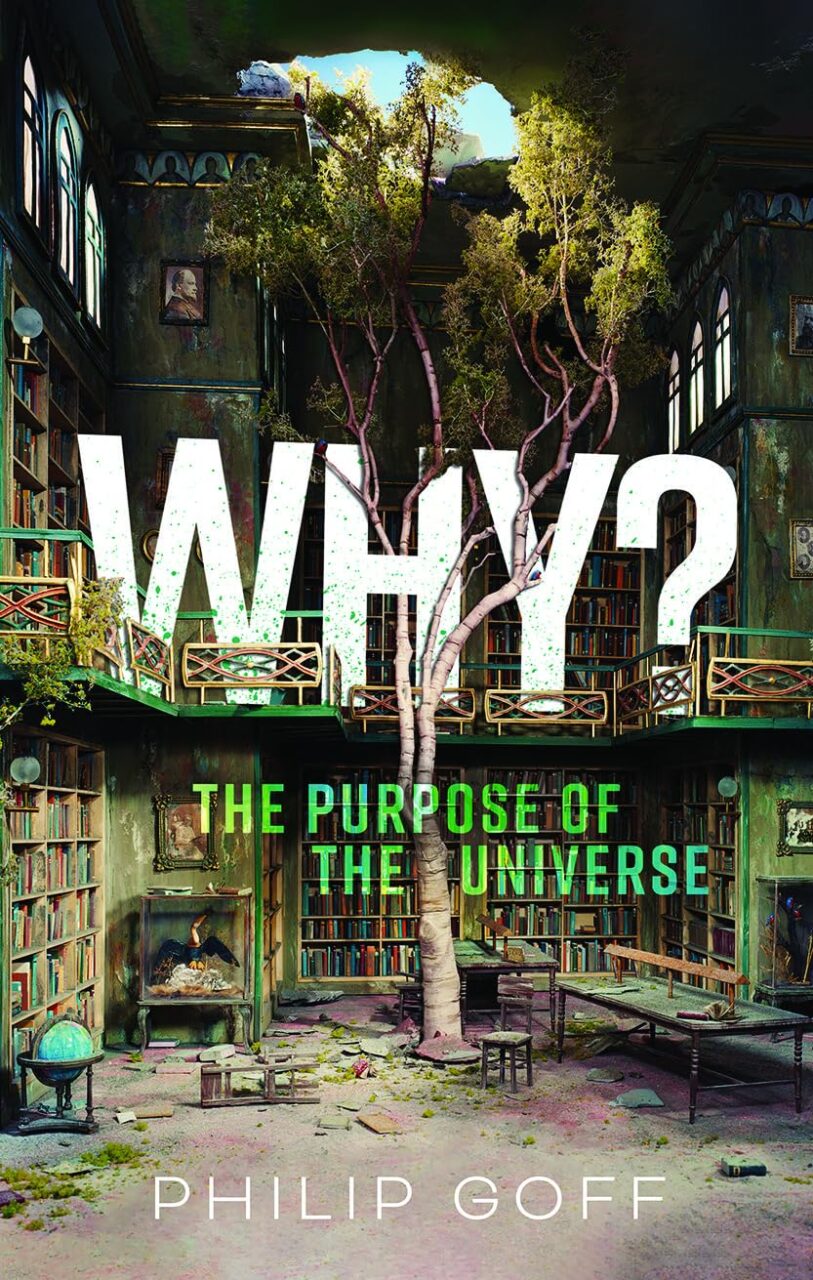Book reviewed by Samuel McKee, September 2025
Why? The Purpose of the Universe
by Philip Goff
Oxford: Oxford University Press, 2023; 192 pages
ISBN 9780198883760, first edition, hardcover
AU$27
Philip Goff’s personal journey into what he terms a heretical form of Christianity has been intriguing to watch. Having encountered his views before, I find them to be well thought through. He holds a similar philosophy to others in the history of science and religion such as Sir Arthur Eddington, who likewise blazed an unconventional path.
Why extends his previous writings on panpsychism as he asks philosophical questions of the Anthropic Principle, popularly known as cosmic “fine-tuning.” His conclusion is that the challenge of the immense improbability of this fine-tuning, the existence of consciousness, and its associated difficulties such as the mind body problem, mean that the universe itself is infused with purpose. He extends this to argue that the problem of suffering means that the “Omni-God” is unlikely, resulting in the conclusion that a “Limited Designer” is behind ultimate reality. Whilst much of this may seem controversial to those with a materialist philosophy, he makes his case that this is a growing viewpoint with more research behind it.
The universe must have purpose (p. 2), yet to Goff, a personal God seems unlikely (p. 3). Given the implausibility of the value nihilist position that has often been taken in philosophy, which itself is an anti-reason position (p. 11), a single divine mind behind the workings of the universe is much more likely (p. 16). This has been the traditional view of the theist in philosophy of religion.
However, Goff builds a different case. He argues for what he terms the “Value-Selection Hypothesis” which says that the fundamental constants and quantities underlying the fabric of the universe are ordered to allow for a universe of value and purpose (p. 21). This brought about a goal-directedness from the very beginning of the universe (p. 22). To Goff this is so obvious it seems strange to have to defend it, but it is the association with natural theology that has caused it to be rejected out of hand by scientists and philosophers (p. 23). Given the incredible improbability of chance or materialistic explanations satisfying the data of fine-tuning, cosmic purpose appears the only viable option (p. 31). Goff wields his philosophical tools with stern prowess in dealing with explanations such as the multiverse, and modern ideas of inflation and simulation theory (p. 30). For a relatively short book that separates the technical and more accessible in helpful fashion within each chapter, he manages to incorporate Bayesian methods and the tools of the logician in a way that the lay philosopher can readily grasp. Chance is ruled out thoroughly (p. 34).
When turning to consciousness, Goff is even more blunt in his assessment regarding its currently insurmountable problems from neuroscience and philosophy of mind, and disposes of any expectation of a materialistic explanation in the near or distant future (p. 47). There is no apologetics for panpsychism at this point, but instead a rigorous exposition of the landscape of consciousness. Science cannot be the full story of reality. This leads him to introduce “pan-agentialism” which posits agency as the root of physical reality (p. 50). The former atheist in Goff is admittedly reluctant to arrive at his conclusions regarding the hard problem of consciousness but one finds his honesty as refreshing as his rigour. Micro-reductionism cannot account for agency at the level of particles (p. 54). One is left then with panpsychism, which is where Goff does become something of an apologist. Consciousness pervades the fabric of the universe at its most fundamental level (p. 58).
Goff commits much energy in the latter portion of the book to fleshing out this claim and one instinctively recoils at the idea. However, he is persuasive in marching us from particles to tigers then humans in presenting explanations at each level with recourse to science and philosophy (p. 67). This is not at all different from the arguments of Erwin Schrödinger and Sir Arthur Eddington in the interwar period (p. 75). Goff feels the intersection of each half of his book cannot be mere coincidence: consciousness and cosmic fine-tuning seem to fit (p. 76).
The conclusion Goff reaches after a detour through the problem of evil is that of sceptical theism (p. 96) and the existence of a Limited Designer (p. 118). I expect this will satisfy neither side, yet historically it has fared well with some surprising voices from both science and philosophy (p. 125).
Given the lack of progress from materialism in either consciousness or fine-tuning, and with no promise on the horizon for it, Goff at least has made a far superior case than any made from the sceptical camp and he gives both sides of the debate plenty to consider (p. 127). When one takes physics as pure mathematics at its base, then one is simply describing structure which cannot produce consciousness, yet he contends that “the mathematical structures of physics cannot produce consciousness, but consciousness can produce the mathematical structures of physics” (p. 127).
His conclusion presents his own spiritual journey to what he calls a heretical form of religious faith, drawing on mysticism and its Eddingtonian compatibility with panpsychism and his Limited Designer Hypothesis. Here he defends the rationality of this faith from those that see it as more evidence of an abandonment of reason. His story interweaves the personal and philosophical. For Goff, this leap of faith is both rationally justified and intellectually consistent with a structuralist and realist philosophy of science (p. 143).
This is an interesting contribution to the analysis of the implications of cosmic fine-tuning, the hard problem of consciousness and our search for meaning in a mathematical universe. Goff well-defends his case that “The universe looks very different when we stop pretending we’re mechanisms” (p. 150) and I applaud his attempt at justifying panpsychism within a scientific framework.

